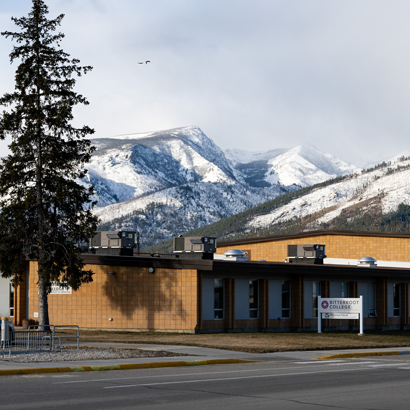Surgery Technology (A.A.S.)
Program Overview
This program is designed to prepare the student for employment as a surgical technologist, who are an integral part of the team of medical practitioners providing surgical care to patients.
Surgical technologists work under the supervision of a surgeon to facilitate the safe and effective conduct of invasive surgical procedures, ensuring that the operating room environment is safe, that equipment functions properly, and that the operative procedure is conducted under conditions that maximize patient safety.
Surgical technologists possess expertise in the theory and application of sterile and aseptic technique and combine the knowledge of human anatomy, surgical procedures, and implementation of instrumentation and technologies to facilitate a physician’s performance of invasive therapeutic and diagnostic procedures.
Pathway
UM Bitterroot offers an affordable avenue to pursue a career in the healthcare industry. Students complete prerequisite coursework at UM Bitterroot and then apply for the surgery technology program admission at Missoula College. Graduates earn their Associate of Science degree in Surgical Technology.
After prerequisites the surgery technology program is a three semester program (spring, summer, fall) or (spring, fall, spring) resulting in an Associate's of Applied Science (AAS) Degree.
Students are required to rotate sites during the clinical portion of their education, which may include rural and critical access facilities. During the final semester of the program, internships will be arranged outside the Missoula area for a minimum of two weeks. Transportation and housing are the student's responsibility. Prior to entering a healthcare facility for clinical experiences, a student will be required to submit a background check and complete a drug screening. Many healthcare facilities have increasingly stringent requirements. A student may be refused entry into a clinical facility based on information disclosed in the background check. If this is a concern, please consult the Program Director. If a student is denied agency access based on the background check, there will be no placement at an alternate site, and the subsequent inability of the student to complete the clinical education will result in the inability to continue in the Surgical Technology program.
Surgery Technology Degree Map
Employment Outcomes
Surgical technologist are an integral part of the team of medical practitioners providing surgical care to patients. Most surgical technologist work in hospitals. The median pay for surgical technologists is $48,510 annually ($23.32 per hour). According to the US Bureau of Labor Statistics there is decent growth is this field making it an in-demand career. Careers include: Surgical Technologist, Surgical Technician, Scrub Tech, Operating Room Technician, Operating Room Assistant, Oral Surgery Technician, and Tissue Recovery Technician.
A student will become a member of the Association of Surgical Technologists during the second semester in the program. A student anticipating program completion will take the National Certification Exam prior to graduation. A student who successfully completes the Surgical Technology program is awarded an Associate of Applied Science degree in Surgical Technology. The credential of Certified Surgical Technologist (CST) will be awarded to a student upon passing the National Certification Exam and graduation from the program. This credential is awarded by the National Board of Surgical Technology and Surgical Assisting (NBSTSA).
Bureau of Labor Statistics, U.S. Department of Labor, Occupational Outlook Handbook, Surgery Technologist, (updated Aug 2023).
Application Process
Admission to the program is competitive and requires prior completion of 16 credits of pre-requisite coursework. The program's core classes begin every spring semester and include 48 credits of classroom and laboratory instruction as well as hundreds of hours of experiential, hands-on clinical training within the operating room.
Students must apply to the program by October 1 of each year. Students may apply while working on their prerequisite courses with acceptance to the program to be determined after autumn semester grades are finalized. BIOH 201N/BIOH 202N (Anatomy and Physiology I and lab) must be passed with a minimum grade of B (3.0). The program-specific courses begin spring semester.
Surgery Technology Program Application
The Surgical Technology program is accredited by the Committee on Accreditation of Allied Health Education Programs (CAAHEP), 9355 – 113th St. N, #7709; Seminole, FL 33775 (www.caahep.org) upon recommendation of the Accreditation Review Council on Education in Surgical Technology and Surgical Assisting (ARC-STSA), 19751 East Mainstreet, Suite #339; Parker, CO 80138 (www.arcstsa.org).
